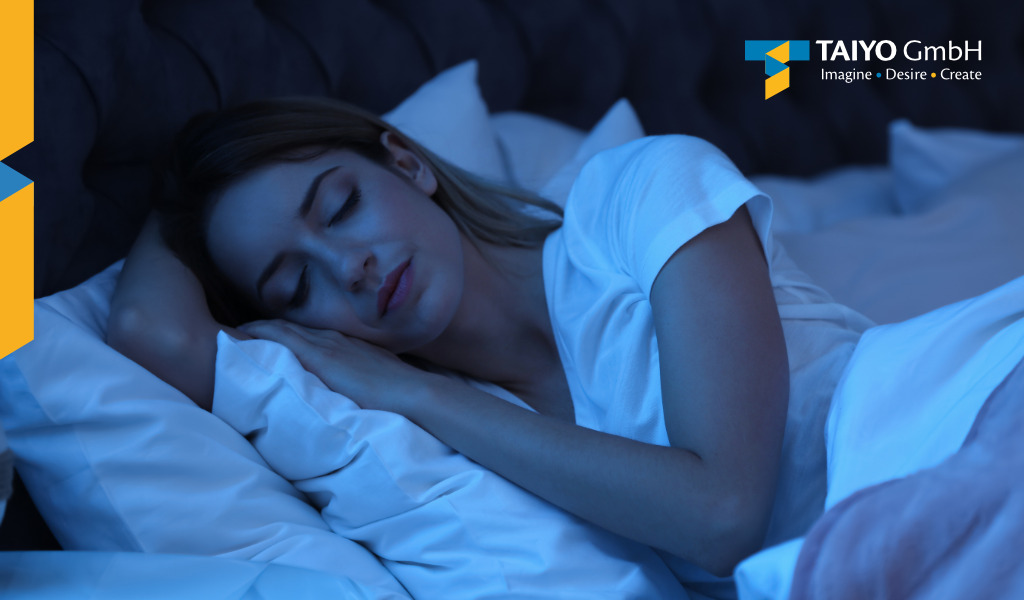Many people are experiencing sleep problems and they are not sleeping well these days. Working long hours, stress and/or drinking alcohol in the evening are all factors that can adversely affect normal sleep patterns. At the same time, the COVID-19 lockdown is taking its toll. Although one might think that this would enable people to take their foot off the work-life accelerator, it’s actually causing more stress than ever before. People sit at home all day, spend most of their time on video calls and, at the end of the day, have seen nothing but their desk or dining table. Unfortunately, there is no panacea for this situation and the resulting emotional strain can make getting quality sleep difficult.
Why is sleep so important?
Sleep plays an important role in our health and well-being. As we age, the amount of sleep we need to maintain our mental and physical health varies. How one feels while awake depends to a greater extent on what happens while we sleep. During this period of diurnal downtime, the body works to support the healthy functioning of our organs, especially the brain. In children and adolescents, sleep also supports growth and development.
A lack of sleep can cause both short-term and long-term damage. In the short term, sleep deprivation can impair thinking, concentration and learning abilities, whereas long-term sleep deprivation can even increase the risk of chronic disease (National Heart, Lung, and Blood Institute, 2021).
Natural sleep treatments
Some of the most sustainable ways to improve sleep quality include meditation, yoga, calming teas and supplements containing St John’s wort, lemon balm, melatonin and L-Theanine.
Because of its warmth and the natural tendency to drink it slowly, hot teas can have a soothing effect. Tea also contains L-Theanine, which most people know as the calming component in green tea. However, L-Theanine is also available as a dietary supplement and is used in products that are formulated to help with relaxation, concentration and sleep.
What exactly is L-Theanine?
L-Theanine is an amino acid — formed by the reaction of ethylamine and glutamine — found in the leaves of the green tea plant Camellia sinensis. In 1949, L-Theanine was identified in tea by Japanese scientists. And although tea is the most common source of L-Theanine, this compound is also found in a few species of fungi. In foods, especially green tea, L-Theanine is thought to be a source of umami, the savory, glutamate-like flavor.
Scientists studying umami flavor have made some interesting discoveries. Umami has been linked to a reduced risk of obesity. It can stimulate metabolism, increase satiety and extend the time before hunger returns after eating (Fleming, 2013).
The glutamine in L-Theanine is an important identifier of natural green tea extracts containing L-Theanine. By the taste of the powder or the smell of a capsule, the naturalness of the product can be quickly identified.
How does L-Theanine work?
L-Theanine promotes relaxation and facilitates sleep by contributing to a number of changes in the brain: L-Theanine increases levels of GABA (γ-aminobutyric acid) and other neurotransmitters in the brain. It also increases serotonin and dopamine levels. These neurotransmitters play a special role in regulating states such as sleep or state of mind, and regulate emotions, mood, concentration, appetite, energy and other cognitive abilities in the brain. Increased concentrations of these neurotransmitters promote relaxation and may aid in falling asleep (Kimura, 2007).
L-Theanine also increases alpha brain waves. Alpha brain waves are associated with a state of “awake relaxation.” This is the state of mind experienced when meditating, being creative or daydreaming. Alpha waves are also present during REM sleep (paradoxical sleep; increased rate of eye movement under the eyelids). L-Theanine appears to trigger the release of alpha waves, promoting relaxation, focus and creativity. One of the best aspects of L-Theanine is that it induces relaxation without putting you into an unfocused state or making you drowsy. This makes the amino acid a good choice for people who want to improve their “awake relaxation” without worrying about becoming sleepy and tired during the day (Mason, 2004).
What are the benefits of taking L-Theanine?
With the ability to increase relaxation and reduce stress, L-Theanine can improve sleep in several ways. It can help you to fall asleep faster and easier. Research shows that L-Theanine can improve sleep quality by reducing anxiety and promoting relaxation — and not by acting as a sedative (Rao et al., 2015).
There is evidence that L-Theanine may help to improve sleep quality in children with attention deficit hyperactivity disorder (ADHD). One study examined the effects on sleep of boys aged 8 to 12 years old and found that dietary supplementation with L-Theanine was a safe and effective way to improve overall sleep quality and helped the boys to fall asleep faster (Lyon, Kapoor & Juneja, 2012).
L-Theanine is a so-called anxiolytic, meaning that it reduces anxiety. Some anxiolytics, such as valerian and hops, have a calming effect, but they also make you sleepy. L-Theanine, by contrast, promotes relaxation and stress reduction without fatigue. It has positive effects on the mental and physical symptoms of stress, including lowering both heart rate and blood pressure (Rao et al., 2015).
To improve sleep quality in the long-term, a dosage of 100–400 mg before bedtime is recommended. Up to 400 mg can be taken for acute feelings of stress, or 100 mg four times throughout the day to promote lasting relaxation and to suppress anxiety (Rao et al., 2015).
Author: Laura Ingenlath, Quality Manager, Taiyo GmbH.
This is a translation of the article: “Schlafen Sie gut”, published in the German magazine “Vitalstoffe 1/2021”, BK nutri network.
If you have any questions regarding Taiyos L-Theanine products Suntheanine® or the 100% natural Sunphenon® TH 30 please do not hesitate to contact us.
References:
Fleming, A (2013): Umami: Why the fifth taste is so important. In: The Guardian. Last access 16th Feburary 2021. https://www.theguardian.com/lifeandstyle/wordofmouth/2013/apr/09/umami-fifth-taste.
Kimura, K. (2007): L-theanine reduces psychological and physiological stress responses. In: Biological psychology, 71 (1), p. 39-45.
Lyon, M. R., Kapoor, M. P. & Juneja, L. R. (2012): The Effects of L-Theanine (Suntheanine®) on Objective Sleep Quality in Boys with Attention Deficit Hyperactivation Disorder (ADHD): A Randomized, Double-blind, Placebo-controlled Clinical Trial. In: Alternative Medicine Review, 16 (4), p. 348-354.
Mason, R. (2004): 200 mg of Zen: L-theanine Boosts Alpha Waves, Promotes Alert Relaxation. In: Alternative and Complementar Therapies, 7 (2), p. 91-105.
National Heart, Lung and Blood Institute (2021): Sleep Deprivation and Defiviency. Last access 3rd March 2021. https://www.nhlbi.nih.gov/health-topics/sleep-deprivation-and-deficiency.
Rao, T. P. et al. (2015): In Search of a Safe, Natural Sleep Aid. In: Journal of the American College of Nutrition, 34 (5), p. 436- 347.
Picture source: Shutterstock | New Africa






